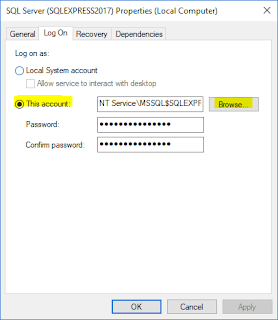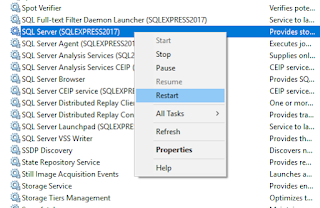I was trying to retrieve data from excel in T-SQL using the following statement:
SELECT * FROM OPENROWSET('Microsoft.ACE.OLEDB.12.0',
'Excel 12.0;Database=C:\MyPath\MyFile.xlsx;;HDR=YES;IMEX=1', [Sheet1$])
But was receiving the error message.
Cannot initialize the data source object of OLE DB provider "Microsoft.ACE.OLEDB.12.0" for linked server "(null)".
While searching solution for this error, I have found multiple reasons that leads to differents solutions to fix this issue. Here are the options I have found during my search.
-
Solution 1:
- Check if the file name is correct/exists?
- Check if the path/directory name is correct/exists?
-
Solution 2:
Check if the target file is open, then close it and run your query again.
-
Solution 3:
Check if you have
Microsoft Access Database Engine 2010installed? If not, you can download it fromMicrosoft. A system restart may also be helpful. -
Solution 4:
Run SSMS as admin.
-
Solution 5:
Check if the user has rights on
SQL ServerService. If not you have to set the proper account/user for this service. Follow these steps:-
Open the services console by typing
Services.mscin the run command. -
Find the service with name
SQL Server(MyInstanceName)(MyInstanceName is the name of your instance), right click on it and clickProperties. -
In the Properties dialog box, move to
Log Ontab, againstThis account: radio option, click theBrowsebutton, aSelect Userdialog box will appear. -
In the
Select Userdialog box, enter the proper user name or you can find from the list by click onAdvancebutton and search for the desired user. Once user is selected, clickOK. -
Then back on the
Log Ontab, enter the passwords, pressApply, then pressOK. -
Restart the service to make the changes take effect.
-
Open the services console by typing
-
Solution 6:
You have to enable
Ad hoc distributed queries:Exec sp_configure 'show advanced options', 1; RECONFIGURE; GO Exec sp_configure 'Ad Hoc Distributed Queries', 1; RECONFIGURE; GO -
Solution 7:
Check the
In ProcessandDynamic Parametersoptions for the ACE provider, use following T-SQL command.EXEC master.dbo.sp_MSset_oledb_prop N'Microsoft.ACE.OLEDB.12.0' , N'AllowInProcess', 1 GO EXEC master.dbo.sp_MSset_oledb_prop N'Microsoft.ACE.OLEDB.12.0' , N'DynamicParameters', 1 GO -
Solution 8:
If you are using select statement with specific columns, make sure the column names are correct. For example in this query:
SELECT [Col A], [Col B] FROM OPENROWSET('Microsoft.ACE.OLEDB.12.0', 'Excel 12.0;Database=C:\MyPath\MyFile.xlsx;;HDR=YES;IMEX=1', [Sheet1$])Check if
[Col A]and[Col B]actually exist in your spreadsheet?-
Sheet name might be wrong. Do
Sheet1(in excel) actually exist in your spreadsheet? Have you appended$sign with sheet name in your query like[Sheet1$].
-
Solution 9:
Check if your user have the write access on theTempfolder, e.g.C:\Users\MyUser\AppData\Local\Temp (MyUser is your user name)
-
Solution 10:
Check the permissions on the
Tempfolder located inServiceProfiles. You have to pick the one based on whether you use a local system account or network domain account.For local system account, you have to select:
C:\Windows\ServiceProfiles\LocalService\AppData\Local\TempFor network domain accounts, folder is:
C:\Windows\ServiceProfiles\NetworkService\AppData\Local\TempRight click on this folder and give it read write access to the account executing the code.
I tried some of the above solutions to get rid of this error.
If any one has some other solution that helped him solve the issue please share in the comments section below.
References:
- https://docs.microsoft.com/en-us/sql/database-engine/configure-windows/ad-hoc-distributed-queries-server-configuration-option?view=sql-server-2017
- https://stackoverflow.com/questions/26267224/the-ole-db-provider-microsoft-ace-oledb-12-0-for-linked-server-null
- https://www.aspsnippets.com/Articles/The-OLE-DB-provider-Microsoft.Ace.OLEDB.12.0-for-linked-server-null.aspx
- https://visakhm.blogspot.com/2013/12/how-to-solve-microsoftaceoledb120-error.html




No comments:
Post a Comment